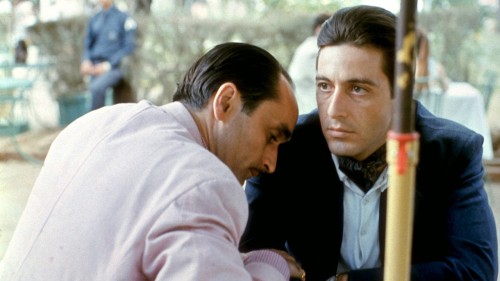The Godfather: Part II (Francis Ford Coppola, 1974)

Robert De Niro (Vito Corleone), Al Pacino (Michael Corleone), Robert Duvall (Tom Hagen), Diane Keaton (Kay Adams), Talia Shire (Connie Corleone), John Cazale (Fredo Corleone), Lee Strasberg (Hyman Roth). Screenplay by Mario Puzo and Francis Ford Coppola. Directed by Francis Ford Coppola. Rating: 18. Running time: 200 minutes.
There is a scene in The Godfather Part I where after meeting with the heads of the five families, Vito announces that the Barzinis, not the Tattaglias, were the source of the problems for the Corleone family all along. It’s a rare, cryptic moment in an otherwise transparent film, and it forces us to revisit the previous scene time and time again, taking care to listen to the dialogue, watching intensely for clues in the body language.
This one aspect is taken from the first film, and magnified tenfold for the second. Coppola, having exhausted most of Puzo’s original novel already, had to write new material for Michael’s story here, and in doing so he weaves an intricate web of family politics, second-guessing and deception, testing our ability to pay close attention to the limit. Repeat viewings are needed to fully follow and appreciate the story here, but its consistency and complexity is undoubtedly there, and thoroughly rewarding when mastered. At over three hours in length, stories as epic as this just aren’t made anymore. Only against the backdrop of a film as magnificent as Part I could Coppola have gotten permission to develop this one in so much detail, slowly building up a picture that is carried quite incredibly by his stellar cast.
Thank God De Niro failed in his auditions to play Santino. That may have given us the historic privilege of seeing him exchange lines with both Al Pacino and Marlon Brando in the space of one film (good Lord), but then we would also have sacrificed what we’re gifted here: him embodying the younger Vito, smoothly speaking Italian only a year after his raw debut in Mean Streets, making a name for himself in a much older-looking Little Italy. These flashbacks at times threaten to rival the film’s already-outstanding main focus. Both strands are totally watchable on their own, but wouldn’t be half as incredible if not serving as a contrast throughout between the effortlessness with which Vito created fortune for his family, and the strife that Michael encounters later on to hold a disintegrating family together.
I had never appreciated, watching this at a younger age, just how desperate Michael’s situation is. By the end of Part I he has already lost most of his family through either old age or hits, but here the deaths continue just as his marriage breaks down, business is bad and assassinations begin on his own life. The existence he ends up owning almost makes us forget what he was like before, as that innocent young war-hero back at Connie’s wedding. And then we’re given one final flashback to the old Michael who recognised the hypocrisy of the Corleone family’s way of life, who wanted nothing to do with its idea of business and obligation, and was quite content to let Santino take control. Only his brother Fredo congratulates him on his decision to risk his life for his country after the events of Pearl Harbour, rather than focusing exclusively on his closer ties with his flesh and blood. What a tragedy that memory must turn out to be, for a man who ends the film alone, smoking on a bench, with the weight of many murders on his mind.
It’s hard to decide which of the opening two parts of this incredible trilogy is better. Part I was, obviously, the original, and it had Brando and everything new going for it. But Part II does something quite outrageous, in providing new, utterly worthy material for the continuation of a story and world which had already reached the peaks of cinematic excellence. Both have their virtues; both are absolute masterclasses in the creation of drama.
Filed under: crime, drama | Leave a Comment
Tags: diane keaton, francis ford coppola, fredo corleone, godfather, godfather part 2, john cazale, little italy, marlon brando, mean streets, michael corleone, pearl harbour, robert de niro, robert duvall, santino corleone, talia shire, vito corleone
No Responses Yet to “The Godfather: Part II (Francis Ford Coppola, 1974)”